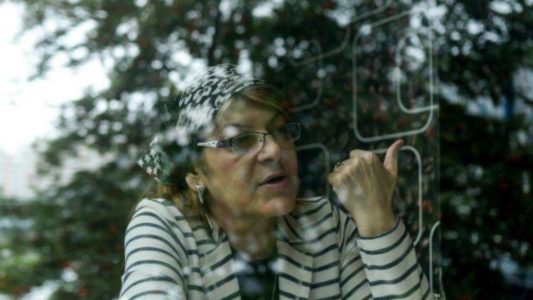
Chechnya sends ex-Islamic State women into schools
Mother of five Zalina Gabibulayeva says she was “tricked” into joining the jihadists in Syria five years ago. Now, repentant and repatriated to Russia’s Chechnya, she goes into schools to teach others of the dangers of extremism.
Countries around the world are grappling with the question of how to treat citizens who travelled to the Islamic State “caliphate” and have since decided to return.
That problem is felt particularly keenly in Russia, which has seen thousands of people leave to fight alongside jihadists in Syria, according to President Vladimir Putin.
While some Western nations have stripped IS recruits of citizenship or banned them from coming back, Russia has actively repatriated women and children — though the return of women was suspended more than a year ago over security concerns.
Most of Russia’s IS recruits came from Muslim-majority Caucasus republics such as Chechnya, the site of two bloody separatist conflicts with Moscow in the 1990s and now notorious for human rights abuses.
The republic however has welcomed in women like Gabibulayeva — with the expectation some go to work to prevent young Muslims from becoming radicalised.
“We’re useful. We can tell the new generation about what happened to us, so they don’t make the same mistakes we did,” the 38-year-old says as her two youngest children play on the floor of her flat in regional capital Grozny.
Wearing a leopard-print khimar veil covering her head and body, she describes visiting schools or colleges a couple of times a week across Chechnya and neighbouring republic Ingushetia.
There she tells young people how she fell for propaganda from the Islamic State group before her family moved to the “caliphate” and found “cruelty, horror…it had nothing to do with Islam”.
Gabibulayeva was already widowed when she went to Syria with her children, but married a Macedonian there after discovering discrimination against women without a husband.
Later the pair tried to escape via Iraq, where he was arrested and she was sent to a refugee camp, from which she was eventually brought back to Russia.
Gabibulayeva moved to Chechnya after receiving a suspended sentence in her native republic of Dagestan.
While using former members of extremist groups in education is not unusual, analysts told AFP this was the first such schools programme they were aware of using returnees from the Islamic State.
“It’s very difficult for (the women) to talk about their experience but we get them to understand it’s a way to show they repent,” says Kheda Saratova, who sits on the rights council of Chechnya’s authoritarian leader Ramzan Kadyrov.
Saratova — who manages repatriation efforts with Kadyrov and Moscow’s backing — said young people were turned off by traditional lecturing about the dangers of extremism.
“But when someone appears before them to say in detail how they were radicalised, what they did there, how they managed to escape…they see the real picture, the real face of this terrorist organisation.”
Source: France 24





